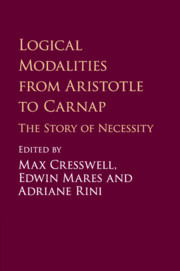Book contents
- Frontmatter
- Contents
- List of Figures and Tables
- List of Contributors
- List of Abbreviations
- Introduction
- 1 Aristotle on the Necessity of the Consequence
- 2 Aristotle on One- Sided Possibility
- 3 Why Does Aristotle Need a Modal Syllogistic?
- 4 Necessity, Possibility, and Determinism in Stoic Thought
- 5 Necessity in Avicenna and the Arabic Tradition
- 6 Modality without the Prior Analytics: Early Twelfth Century Accounts of Modal Propositions
- 7 Ockham and the Foundations of Modality in the Fourteenth Century
- 8 Theological and Scientific Applications of the Notion of Necessity in the Mediaeval and Early Modern Periods
- 9 Locke and the Problem of Necessity in Early Modern Philosophy
- 10 Leibniz's Theories of Necessity
- 11 Leibniz and the Lucky Proof
- 12 Divine Necessity and Kant's Modal Categories
- 13 Charles Sanders Peirce on Necessity
- 14 The Development of C. I. Lewis's Philosophy of Modal Logic
- 15 Carnap's Modal Predicate Logic
- Bibliography
- Index
10 - Leibniz's Theories of Necessity
Published online by Cambridge University Press: 05 September 2016
- Frontmatter
- Contents
- List of Figures and Tables
- List of Contributors
- List of Abbreviations
- Introduction
- 1 Aristotle on the Necessity of the Consequence
- 2 Aristotle on One- Sided Possibility
- 3 Why Does Aristotle Need a Modal Syllogistic?
- 4 Necessity, Possibility, and Determinism in Stoic Thought
- 5 Necessity in Avicenna and the Arabic Tradition
- 6 Modality without the Prior Analytics: Early Twelfth Century Accounts of Modal Propositions
- 7 Ockham and the Foundations of Modality in the Fourteenth Century
- 8 Theological and Scientific Applications of the Notion of Necessity in the Mediaeval and Early Modern Periods
- 9 Locke and the Problem of Necessity in Early Modern Philosophy
- 10 Leibniz's Theories of Necessity
- 11 Leibniz and the Lucky Proof
- 12 Divine Necessity and Kant's Modal Categories
- 13 Charles Sanders Peirce on Necessity
- 14 The Development of C. I. Lewis's Philosophy of Modal Logic
- 15 Carnap's Modal Predicate Logic
- Bibliography
- Index
Summary
Introduction
It is not uncommon to say that rationalism, interpreted in a strict, consistent, and thoroughgoing manner, entails necessitarianism – the view that everything that happens necessarily and that there are no unactualized possibles. For, according to the principle of sufficient reason (PSR), there is a reason why everything is so and not otherwise, or, put differently, nothing exists for which there is not a reason why it is so and not otherwise. In the realm of the apparently contingent happenings of the world, this means that every event has a reason for its coming to be, and every event is itself the reason for the occurrence of some other event. Every event is, it seems, necessitated by some previous event. More worrisome for some philosophers, if every event or action is necessitated by some particular event or action, then it is not the case that an agent could have done otherwise. He or she is not free; he or she is not morally responsible. Moreover, if God is good and the creator of the universe, then God must bring into existence the best world; it is impossible for God to have actualized another world; hence, strictly speaking, there are no unactualized possibles. That, at least, is the short version of the story.
And it is not so far from the truth to say that something like this story – or rather the worry that it manifests – was running through the mind of Gottfried Wilhelm Leibniz (1646–1716) as he contemplated the implications of his own budding version of rationalism. Writing in 1689, Leibniz remarks that his reflections on the principle of sufficient reason led him “very close to the view of those who think that everything is absolutely necessary” (A VI iv 1653/AG 94). What pulled him back from this “precipice” was the consideration of possible things that neither are nor will be nor have been. In other words, let the simplistic argument be that rationalism implies necessitarianism. Leibniz simply rejected the consequence, and by modus tollens concluded that the antecedent needed refinement. But how? Leibniz, more than any other philosopher, placed great weight on the PSR; he really did believe that there was a reason for everything.
- Type
- Chapter
- Information
- Logical Modalities from Aristotle to CarnapThe Story of Necessity, pp. 194 - 217Publisher: Cambridge University PressPrint publication year: 2016



